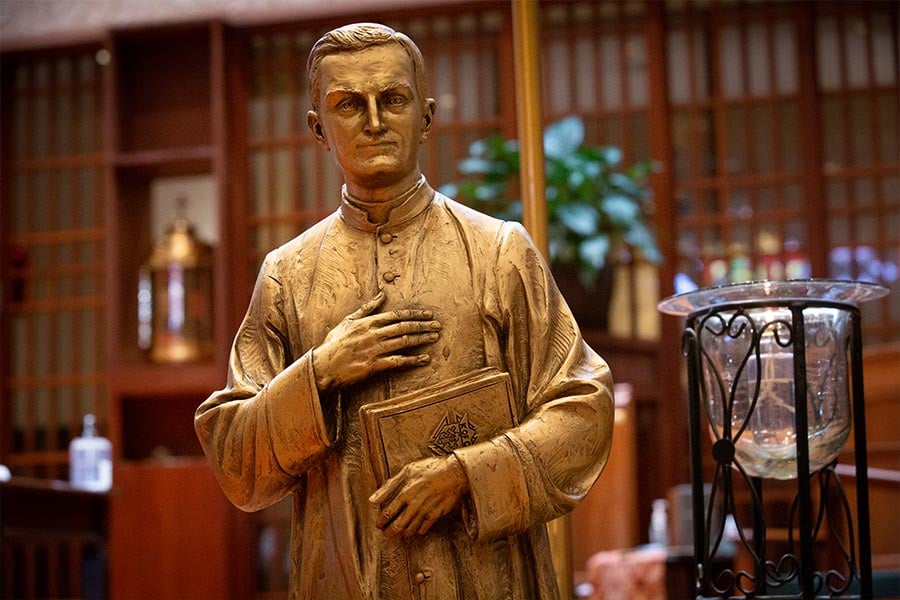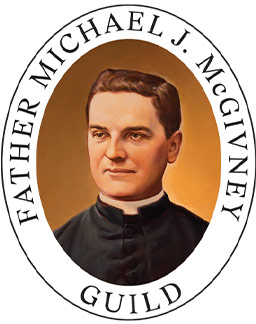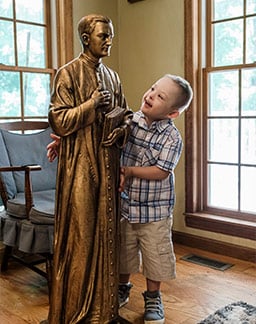Blessed Michael McGivney, Knights of Columbus founder, on path to sainthood for whole Church

A statue of Father Michael McGivney, the founder of the Knights of Columbus, stands before the altar at Saint Andrew Catholic Church as knights from across the diocese gather to celebrate the beatification of their founder, Saturday, October 31, 2020.
Every morning, Michael and Mary Becan recite the Prayer for the Canonization of Blessed Michael McGivney, the young 19th-century U.S.-born priest who founded the Knights of Columbus and was beatified Oct. 31 of last year, making him one step away from being named a saint.
Their daily prayer regimen — whether they’re together or speaking with each other over the phone when they’re apart — consists of going through the readings for the day and a daily meditation, followed by an intercessory prayer. The Becans, who attend St. Joseph Parish in Nocona, used to pray novenas to different saints for their intercessions, but have been consistently seeking Bl. McGivney’s intercession since he was considered a “Servant of God” — the first step toward sainthood.
“Rather than do a [nine-day] novena, it’s perpetual,” Michael said. “We do a petition for so many days, then thanksgiving for so many days.”
Michael is a past grand knight of MonCla Council 14339, serving St. Jerome Parish in Bowie, St. Joseph Parish in Nocona, St. Mary Parish in Henrietta, and St. William Parish in Montague. He currently serves as the district deputy for all Knights in Cooke, Clay, and Montague Counties. Mary is the office manager for the same cluster of parishes.
They’ve seen Bl. McGivney’s intercessory prayers at work within their own family. Michael’s daughter from a previous marriage had problems with drug and alcohol abuse and multiple run-ins with the law, culminating in a stint in prison. During this time, she was “skinny as a rail” and “looked like death,” he said.
“She was like an orangutan monkey — she hung from the bar, jumped around, talked out of her head,” Mary said of her stepdaughter. “I just thought drugs had fried her brain.”
After participating in a mentorship program, his daughter’s life started to turn around. She became a model prisoner, and after being released several years ago, has been clean and sober and become a model wife and mother, Michael said.
“This last time she got put in, that’s when I decided, ‘We’re just going to pray to Michael McGivney,’” Michael said. “She used to be very hostile and belligerent to me. All that’s gone. I don’t know if that’s a detectable miracle,” he said, but they still consider it one in their lives.
Model of Service
Father Michael J. McGivney’s beatification makes him the third U.S.-born priest and fourth U.S.-born male to be declared Blessed — the others being Blesseds Father Stanley Rother, Father Solanus Casey, OFM Cap., and Brother Santiago Miller, FSC. His Aug. 13 feast day was marked for the first time this year.
Because of the ongoing coronavirus pandemic, celebrations were kept low-key. Some Knights councils, such as Council 13408 at St. Catherine of Siena Parish in Carrollton, simply held a “Corporate Communion” where members attended the same Mass together and doubled as a recognition of their summer projects. Among these projects include conducting food drives, repairing a parishioner’s fence, and upgrading the parish’s Society of St. Vincent de Paul building, among others.
“I would think he would really appreciate everything we’re doing,” said third-generation Knight Craig Modrzynski about how Bl. McGivney would view the organization today. “We do so much for the Church and for our communities. When we get men into the order, we’re really giving them lots of opportunities to help us, to help the Church and to help themselves grow in their faith.”
One year later, Bl. McGivney’s beatification and continued path to sainthood is an affirmation of the Knights of Columbus’ mission, says Modrzynski, who also serves as the president of the Knights’ Western Metroplex Chapter, a coalition organization of all Knights councils within the Diocese of Fort Worth geographical boundaries.
“With the things we do with the right to life and the work we do with the Church, we’re becoming a much more spiritual group as opposed to just a fraternity for men,” he said. “We’re going back to what Fr. McGivney wanted — to get the men back in the Church, spiritually.”
Promoter of Christian fraternity
Born to Irish immigrant parents Aug. 12, 1852, Bl. McGivney was ordained a priest Dec. 22, 1877, for what was then the Diocese of Hartford, Connecticut. In his first assignment as parochial vicar of St. Mary’s Church in New Haven, he ministered to the poor, immigrants and working class families. In the anti-Catholic climate of the era, many Catholic men were joining secret societies to feel a sense of belonging.
“With most going so far as to espouse moral standards for members, the Catholic Church could not countenance them. Despite that, many Catholics joined fraternal groups, unwilling to deny either the trend of the times or the pull of their own hearts,” wrote Douglas Brinkley and Julie M. Fenster in their biography “Parish Priest: Michael McGivney and American Catholicism” (100).

“With further problems between parish priests and secret societies, he clearly recognized the need for a fraternal group oriented toward Catholic men,” they wrote later (107). This led to him gathering a group of men to establish what would become the Knights of Columbus, which officially received its charter from the State of Connecticut on March 29, 1882.
“I think Fr. McGivney’s legacy is he cared more for the people,” said Willie Davidson, a founding member and past president of Knights on Bikes, an organization of motorcycle-riding Knights. “One year one of our brother Knights died, and we gave a large donation to the family. We still do those things that Fr. McGivney instilled in us. Fr. McGivney gave us that legacy to make sure we take care of our own.”
Davidson, a past grand knight of Council 7458 at St. Mary of the Assumption Parish in the Near Southside of Fort Worth, said he has brother Knights he can call upon whenever he needs them, noting that Bl. McGivney would do the same, “not just as a priest, but as a family member.”
“We all became more of a family than just an acquaintance,” he said. “He instilled that in all of us: family.”
For Father Tom Kennedy, another third-generation Knight of Columbus, Fr. McGivney’s emphasis on family and fraternity is part of the reason why he serves as a model.
“One of the reasons why I push the Knights on people and try to get people to help through them was because when you do the Knights well, you don’t have to worry about building many of these things into it, because they are built into it. Central to that is supposed to be family. Church first, family second, and then the fraternal nature — which is important and is not replaceable,” said Fr. Kennedy, parochial vicar of St. Joseph Parish in Arlington.
Fr. Kennedy joined the organization about 30 years ago, well before he entered seminary. While a student at Assumption Seminary in San Antonio, he became the first grand knight of what would become the seminary’s St. John Paul II Council 13523. He currently serves as chaplain of the parish’s St. Joseph the Worker Council 13470, and friar of the Mary Queen of Peace Assembly 2112, the Knights’ Fourth Degree entity serving all of the parishes within the Arlington Area Deanery’s geographic boundaries.
“He shows us what we’re supposed to do. He identified needs and roles of a parish, and you step in and satisfy them,” he added. “He gathered some fellows together, and they came up with the mission, and here we are, more than 100 years later, the mission has really stayed true, it’s just been expanded, which is a sign the Holy Spirit is involved. It grew to fit the immediate need, but as other needs became apparent, it just adapted.”
Precursor to the New Evangelization
Bl. McGivney’s efforts in getting Catholic laymen more active in their faith life foreshadowed the Second Vatican Council, which emphasized the role of laity in the Church: “The laity are gathered together in the People of God and make up the Body of Christ under one Head. … Now the laity are called in a special way to make the Church present and operative in those places and circumstances where only through them can it become the salt of the earth” (Lumen Gentium 33).

“He was a visionary. He didn’t just simply get men involved in the life of the Church; he got them involved in the life of their families and the life of the world,” said Fr. Kennedy. “You take Christ with you to where you work, and because you’re a good Christian father. People see you through your children, [and] you become a good Christian witness.”
Having both returned to practicing their Catholic faith, the Becans say that they might be one of Bl. McGivney’s miracles, as well, adding that he “hasn’t been guiding us, he’s been dragging us.” The friendships they’ve made in the Knights, both in Nocona and when they lived in Fort Worth, have helped them draw closer to Christ, they say.
“When you’re a Knight, and you get into it, it’s because you have your brother Knights pulling you, drawing you closer to Christ, closer to the mission, closer to the Lord, closer to your brothers,” Michael said. “A lot of things you wouldn’t do on your own, you can do with the Knights 10 times easier, and actually have fun doing it.”
“It’s made me a better person to be around the other wives … on how I view life and my purpose here on earth,” added Mary.
Priestly inspiration
Father Jason Allan, one of the Diocese of Fort Worth’s newest priests, first became familiar with Bl. McGivney when he was a member of the Columbian Squires, the Knights of Columbus’ official youth organization. As a high-schooler, he served as the Chief Squire for Texas.
“He was an inspiration for those of us in the Squires, not just for the priesthood, but for being young and influential in the Church,” he said.
As Fr. Allan was discerning the priesthood, he would read about the lives of other priests — including Bl. McGivney — to get a better understanding of what life would be like. Beyond that, Bl. McGivney is tied to Fr. Allan’s vocation because the beatification occurred during his diaconal year. The priest’s relics were on display at the chapel of Theological College at the Catholic University of America in Washington, D.C., for then-Deacon Allan and his fellow seminarians to ask for intercession.
“I definitely had a kinship with Fr. McGivney,” said Fr. Allan, parochial vicar of Immaculate Conception Parish in Denton. “As I was drawing very close to my own priestly ordination, it was very inspiring because he was a young priest in the U.S. in the modern period, so a very relevant witness for myself to hopefully be able to follow his example in my own priesthood.”
Like Bl. McGivney, Fr. Allan also serves a large immigrant population — out of seven weekend Masses at his parish, three are in Spanish. One of Bl. McGivney’s biggest emphases was the need to serve the whole person, physically and spiritually, Fr. Allan said.
“His work with the Knights of Columbus allowed that to happen by providing for the spiritual needs of the wealthier members and encouraging them to provide for their suffering brothers and sisters, most importantly the poor immigrant community,” he said. “So, it’s a great witness for us as priests here in Texas in a similar situation with an immigrant population that is also suffering, providing the same care, physically and spiritually, and leading parishioners here to continue that work that’s been done.”
Intercessor for the unborn
Bl. McGivney’s ministry to the immigrants and the poor was based on his desire to serve those on the margins, said Fr. Allan. This would include the unborn, he said, making Bl. McGivney an ideal intercessor.
“He had this principle of preferential option for the poor — not just financially poor, but anybody who’d be cast aside or persecuted,” he said. “The unborn children most certainly fall in that category, so I think it’s an obvious connection to make and why the Knights of Columbus — rightly so — do have such a strong emphasis on work in the prolife ministry.”
It’s no surprise, then, that the miracle attributed to Bl. McGivney that led to his beatification was the healing of an unborn child. Dan and Michelle Schachle from Dickson, Tennessee were expecting their 13th child when the boy was diagnosed with a deadly case of fetal hydrops while still in Michelle’s womb, leading a doctor to recommend an abortion.
Instead, Dan, a general agent for the Knights of Columbus’ insurance program in Tennessee, and Michelle joined other general agents and their wives from throughout the organization on a pilgrimage, asking as many people as possible to pray with Fr. McGivney for their baby’s healing. Dan’s friend Chris Stark, the general agent for the Diocese of Fort Worth and parts of West Central Texas, was happy to join the effort.
“Right before that trip was when Michelle was told the baby had 0 percent chance of survival and the doctors were recommending that she abort this child. They chose to go on this trip and alerted some of us of the situation and asked for intercession,” recalled Stark.
During a Mass celebrated by the Knights’ Supreme Chaplain Archbishop William E. Lori of Baltimore at the Our Lady of Fatima Shrine in Portugal, the Gospel passage was “Healing the royal official’s son” (Jn 4:43-54). Stark vividly remembers verse 50: “Go forth, and your son shall live.” Upon returning, Michelle visited the doctor to discover the hydrops were gone.
“We didn’t know at this time, but, looking back, it’s pretty special to say that I played a very small part, just one of many. But it is cool to say you’re a part of this, that you were there when all this is happening,” Stark said. Now that he’s been beatified, Bl. McGivney belongs to everybody, Stark said.
“Before, Fr. McGivney was just the Knights’ founder, but now, Fr. McGivney is for the Church. He belongs to everybody,” he said. “I think men need to be the ones stepping up, bringing families back to church. Fr. McGivney, 100 percent if he was here today, would be leading men to lead their families back to the Eucharist.”
